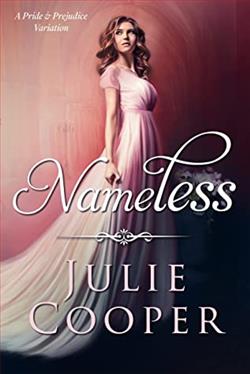Summary

Nameless
by Julie Cooper
“This was not a man who would explode in a rage, or who would give way to shame or temper...which meant my choices were simple: either he had killed her in cold blood, or he had not killed her at all.”
ORPHANED AND ALONE IN THE WORLD, Elizabeth Bennet has found reasonable contentment as a companion to the Dowager Countess of Matlock, the affairs of 1811 and Fitzwilliam Darcy long forgotten. But the past intrudes upon her again, and Mr Darcy returns to her, handsome, wealthy, and widowed, and hiding many secrets beneath his solemn exterior.
BUT IF TIME HAD ALTERED THEIR CIRCUMSTANCES, one thing remains: Mr Darcy still wishes to marry her, and this time, Elizabeth consents. At nearly twenty-nine it is inarguably a good prospect for her and indeed, not until they arrive at his vast estate does she realise how large a shadow his late wife will cast over their growing love. But the new Mrs Darcy’s courage will continue to rise despite the many attempts to intimidate her; and she vows to use whatever power she holds over the master of Pemberley to keep him.
NAMELESS is a tale of the triumph of good over evil, of passion over prejudice, of loyalty over lies…and most of all, of enduring, unfailing love.
.
Read
Nameless on http://kissnovel.net
Martial Peak Reviews
In her novel Nameless, Julie Cooper embarks on a captivating journey that reimagines the beloved characters from Jane Austen's classic world, particularly focusing on Elizabeth Bennet and Fitzwilliam Darcy. Set against the backdrop of 1811, the story explores themes of love, loyalty, and the haunting shadows of the past, all while maintaining a delicate balance between the familiar and the innovative.
The narrative begins with Elizabeth Bennet, now orphaned and alone, finding solace as a companion to the Dowager Countess of Matlock. This setting serves as a poignant reminder of Elizabeth's previous life, where her spirited nature and sharp wit were often at odds with societal expectations. Cooper skillfully captures Elizabeth's internal struggles, illustrating her resilience and adaptability in a world that has changed significantly since her youth. The author’s portrayal of Elizabeth is both relatable and inspiring, as she navigates her new reality with grace and determination.
When Mr. Darcy re-enters Elizabeth's life, he is not the same man she once knew. Now a widower, he carries the weight of his late wife's memory, which looms large over their rekindled romance. Cooper's depiction of Darcy is nuanced; he is a man of depth, grappling with his past while yearning for a future with Elizabeth. The tension between their shared history and the new dynamics of their relationship creates a compelling narrative arc that keeps readers engaged. The author excels in portraying Darcy's internal conflict, making him a multi-dimensional character who is both admirable and flawed.
One of the most striking aspects of Nameless is its exploration of the theme of love overcoming adversity. Elizabeth's decision to accept Darcy's proposal is not merely a pragmatic choice; it is a testament to her enduring feelings for him. Cooper deftly illustrates how love can flourish even in the face of societal pressures and personal insecurities. The couple's journey toward understanding and acceptance is beautifully rendered, showcasing the transformative power of love.
However, the shadow of Darcy's late wife is a formidable presence in their lives. Cooper does not shy away from the complexities of grief and memory, allowing readers to witness how the past can shape the present. Elizabeth's determination to carve out her own identity within the walls of Pemberley is a powerful narrative thread. She vows to use her influence over Darcy to ensure their love prevails, highlighting her strength and agency in a time when women often had little power. This aspect of the story resonates deeply, as it reflects the ongoing struggle for women to assert themselves in a patriarchal society.
Cooper's writing is rich and evocative, immersing readers in the sights and sounds of early 19th-century England. The detailed descriptions of Pemberley and its surroundings create a vivid backdrop for the unfolding drama. The author’s ability to weave historical context into the narrative adds depth and authenticity, making the characters' experiences feel grounded in reality. The dialogue is sharp and engaging, capturing the essence of Austen's wit while infusing it with a contemporary sensibility.
As the plot unfolds, the tension escalates, revealing the darker elements of the story. The themes of loyalty and betrayal come to the forefront as Elizabeth confronts the challenges posed by Darcy's past. The author skillfully navigates these complexities, creating a narrative that is both suspenseful and emotionally resonant. The stakes are high, and readers are left wondering whether love can truly conquer all, especially when faced with the specter of jealousy and manipulation.
In comparison to other works within the genre, Nameless stands out for its intricate character development and emotional depth. While many Austen-inspired novels tend to focus solely on romance, Cooper delves into the psychological and emotional landscapes of her characters, making their journeys feel authentic and relatable. The exploration of Elizabeth's growth as she navigates her new role as Mrs. Darcy is particularly noteworthy, as it highlights the evolution of her character from a spirited young woman to a formidable partner in her marriage.
Ultimately, Nameless is a tale of resilience and the enduring power of love. Julie Cooper has crafted a narrative that not only pays homage to Austen's legacy but also stands on its own as a compelling story of personal growth and emotional complexity. The triumph of good over evil, passion over prejudice, and loyalty over lies resonates throughout the novel, leaving readers with a sense of hope and fulfillment.
In conclusion, Nameless is a beautifully written exploration of love, loss, and the courage to forge one's path. Julie Cooper's ability to breathe new life into familiar characters while addressing timeless themes makes this novel a must-read for fans of historical romance and Austen enthusiasts alike. It is a testament to the idea that love, in all its forms, is worth fighting for, and that even in the face of adversity, one can find strength and purpose.






![The Countdown of My Death is Spamming My Status Window [Official]](/upload/pic/manga/the-countdown-of-my-death-is-spamming-my-status-window--official-.jpg)

















Reviews 0
Post a Reviews: